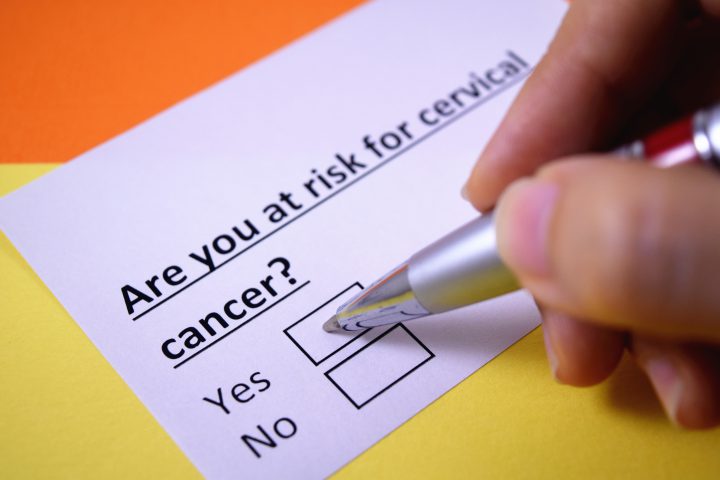Cervical cancer is one of the top five cancers in Indian women. According to the WHO cancer database, it is the fourth most common cause of cancer in women worldwide.
 In this type of cancer, there is an abnormal growth of cells in the cervix, the lower portion of the womb or uterus. As a slow growing cancer, it can be cured if detected early. When not treated at the early stages, the cancer can spread to distant parts of the body.
In this type of cancer, there is an abnormal growth of cells in the cervix, the lower portion of the womb or uterus. As a slow growing cancer, it can be cured if detected early. When not treated at the early stages, the cancer can spread to distant parts of the body.
As with other cancers, cervical cancer is linked to certain risk factors. Knowing what these risk factors are is crucial to take necessary steps to prevent or treat the cancer in its early stages.
Symptoms of cervical cancer
In its early stages, cervical cancer has no symptoms. When the cancer spreads to deeper tissues in the cervix or to other body parts some symptoms are:
- Unusual vaginal bleeding – such as bleeding after vaginal sex, bleeding after menopause, bleeding and spotting between periods, bleeding after douching or after a pelvic exam.
- Having menstrual periods that are longer than usual
- Pain during sex
- Significant weight loss
Risk factors of cervical cancer
Human papillomavirus infection
Human papillomavirus or HPV is a large group of related viruses.
- Of these, some HPV types such as HPV 16 and HPV 18 are associated with increased risk of cervical cancer and are called high-risk HPVs. They are named so because they are strongly linked to various cancers, including cancers of the cervix, vulva and vagina in women and penile cancer in men, and cancers of the anus, mouth and throat in both men and women.
- Other low-risk types including HPV 6 and HPV 11 cause warts on the genital region, hands, tongue or lips.
- HPV is spread via skin-to-skin contact, sexual activity, including oral, anal and vaginal sex.
- Becoming sexually active at an earlier age can put you at higher risk for HPV infection and cervical cancer.
Socioeconomic status
Most of the Cervical cancer patients come from low socioeconomic strata of the population and this is linked to poor menstrual hygiene, making them prone to HPV infections.
Timely screening is one important action, especially when it comes to early detection of cervical cancer and preventing it. And the participation in such screening tests seems to depend upon income, education, social status and other health related assistance. Hence, screening participation of women among lower social classes is less compared to those of higher social classes. Especially in developing countries like India, women of low socioeconomic status have a higher risk of cervical cancer as the participation in cervical cancer screening tests like pap smear is low.
These differences tend to change when active screening participation is promoted, cultural and economic statuses are ignored, education and social support is offered.
Multiple Sexual Partners
Having multiple sexual partners increases the risk of exposure to HPV as a sexually transmitted infection, and this increases the risk of cervical cancer.
Multiple pregnancies
Although the exact reason is not known, full-term pregnancies for three or more times are linked to an increased risk of cervical cancer.
- Studies indicate that hormonal changes that happen during pregnancy may make women prone to HPV infection and cancer.
- During pregnancy, a woman’s immune system may weaken and might pave ways for HPV infection, leading to cancer growth. Generally, HPV infections are common, and the body is capable of eradicating the infection by itself. Sometimes, in people with weak immune systems, the infection doesn’t go away and becomes chronic. And such cases may also increase the risk of cervical cancer.
Smoking
Tobacco has cancer-causing chemicals which can affect not only the lungs but other organs as well. Women who smoke have two times as much risk of cervical cancer as compared to non-smokers to get cervical cancer. According to researchers, these toxins damage the cervical cell DNA and lead to cervical cancer. Smoking also weakens the immune system which is then not able to fight HPV infections.
Immunosuppression and HIV (Weakened immune system)
When the body’s immune system weakens, it is at a higher risk of a HPV infection. Human immunodeficiency virus (HIV) is a virus that causes AIDS and weakens the immune system. In women with HIV, a cervical precancerous condition is likely to become invasive faster than normal. Also, women who are under immunosuppressants to treat various auto-immune diseases, or during an organ transplant may also have a higher risk of developing a HPV infection.
Other factors, like long term use of contraceptive pills and giving birth before the age of 20 may also increase the risk of cervical cancer. Cervical cancer is curable when detected early. To know more about your risk factors, screening tests and treatment options, schedule an appointment with a leading cancer specialist at onco.com.



